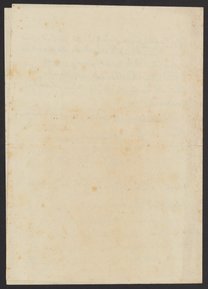Letter from Wilhelm Ostwald to Georg Bredig, September 1923
- 1923-Sep-18

Rights
Download all 4 images
PDFZIPof full-sized JPGsDownload selected image
Small JPG1200 x 1671px — 335 KBLarge JPG2880 x 4009px — 1.8 MBFull-sized JPG4080 x 5680px — 3.4 MBOriginal fileTIFF — 4080 x 5680px — 66.4 MBThe German chemist Wilhelm Ostwald (1853-1932) thanks Georg Bredig (1868-1944) for his friendship and suggests that a work on the crude salts of methyl acetate be included in a volume that Bredig is working on.
| Property | Value |
|---|---|
| Author | |
| Addressee | |
| Place of creation | |
| Format | |
| Genre | |
| Extent |
|
| Language | |
| Subject | |
| Rights | No Copyright - United States |
| Credit line |
|
| Additional credit |
|
| Digitization funder |
|
Institutional location
| Department | |
|---|---|
| Collection | |
| Series arrangement |
|
| Physical container |
|
View collection guide View in library catalog
Related Items
Cite as
Ostwald, Wilhelm. “Letter from Wilhelm Ostwald to Georg Bredig, September 1923,” September 18, 1923. Papers of Georg and Max Bredig, Box 2, Folder 33. Science History Institute. Philadelphia. https://digital.sciencehistory.org/works/2rvtvrp.
This citation is automatically generated and may contain errors.
Image 1
Wilhelm Ostwald – Großbothen (Sa.)
18. Sept. 23
Lieber Freund,
Empfangen Sie meinen herzlichsten Dank für die mehrfachen Gaben, mit denen Sie mich erfreut haben. Auch mir sind unsere langjährigen, stets ungetrübten Beziehungen erinnerungsreich und erfreulich.
Zunächst bitte ich meinen besonderen Dank an die Badische Technische Hochschule entgegenzunehmen, die Sie versetzen, und der ich als Dr. ing. anzugehören stolz bin.
Sodann möchte ich hermerken, dass in das von Ihnen besorgte Ehren-Klassikerbändchen vielleicht noch die
Image 2
(page 2)
Arbeit über die Rohsalze des Methylacetats aufgenommen werden möchte. Es ist die erste Arbeit, welche Messungen katalytischer Wirkungen enthält; sie bringt ausserdem die erste Gesetzlichkeit auf diesen Gebiet: dem Parallelismus mit dem Konstanten des chemischen Gleichgewichts. Auch habe ich seinerzeit diese Katalyse selbst entdeckt; sie war vorher nicht bekannt; ich erwartete sie aber nach gewissen Analogien (Hydrolysen durch Säuren).
Die Ammoniaksynthese aus H2 + N2 mit Eisen als Katalysator hatte ich etwas um 1896 zum Patent angemeldet; als Führer dient mir die Tatsache, dass
(page 3)
NH3 katalytisch durch Eisen zerlegt wird. Meine Krankheit kam dann dazwischen, so dass die Sache nicht fertig wurde.
Für Ihre Rektoratsrede danke ich sehr. Ich habe sie bisher nur flüchtig ansehen können.
Viele herzliche Grüße, auch von meiner Frau.
Ihr ergebener
W. Ostwald
Auch Koll. Askenasy bitte ich meinen herzlichen Dank zu sagen.
Image 1
Wilhelm Ostwald – Großbothen (Saxony)
September 18, 1923
Dear Friend,
Please accept my heartfelt thanks for your many gifts, which have delighted me. I also consider our enduring, pleasant friendship to be fulfilling and rich in memories.
First of all, I would like to ask you to convey my gratitude to the Baden Technical University, which you represent, and which, as a Doctor of Engineering, I am proud to be associated with.
I would also like to point out that the work on the crude salts of methyl acetate should also be included in the honorary classic volume that you are editing.
Image 2
(page 2)
It is the first work containing measurements of catalytic effects. It also brings the first law to this field: parallelism with the constant of chemical equilibrium. I also discovered this catalysis independently at the time. It was not previously known, but I expected it after certain analogies (hydrolysis by acids).
Around 1896, I had applied for a patent for the synthesis of ammonia from H2 + N2 with iron as a catalyst. I was guided by the fact
(page 3)
that NH3 is catalytically decomposed by iron. My illness then interfered, and I never completed the process.
Thank you very much for your rectorate speech. I’ve only read part of it so far.
Warm regards from me and my wife.
Yours faithfully,
W. Ostwald
Please also convey my heartfelt thanks to our colleague, Mr. Askenasy.








